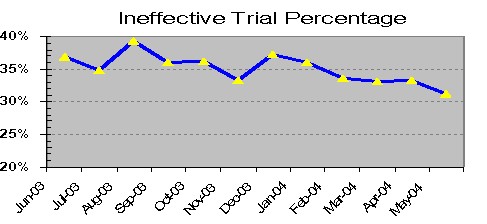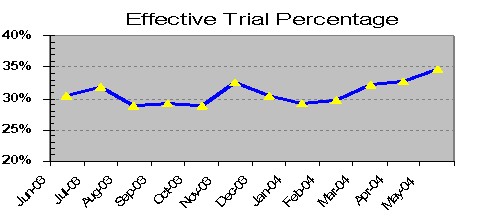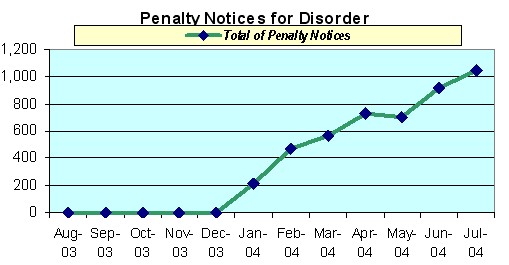Contents
Report 4 of the 09 Sep 04 meeting of the Planning, Performance & Review Committee and provides an update on the work being carried out by the Department of Criminal Justice with the ultimate aim of bringing more offences to justice.
Warning: This is archived material and may be out of date. The Metropolitan Police Authority has been replaced by the Mayor's Office for Policing and Crime (MOPC).
See the MOPC website for further information.
Criminal Justice Update
Report: 4
Date:09 September 2004
By: Commissioner
Summary
This paper provides an update on the work being carried out by the Department of Criminal Justice with the ultimate aim of bringing more offences to justice.
A. Recommendations
That the report be noted.
B. Supporting information
Justice for London / Case Progression Units
1. The final round of training for CPU supervisors was completed on 30 July. This means that CPU Supervisors on all 32 BOCU’s have now received training.
2. Performance measurement of the CPU system, initially targeted at first at the longer established CPUs on Safer Streets Boroughs, is being developed, concentrating on arrest to charge attrition, first time guilty pleas and guilty verdicts.
3. Further five-day courses for CPU supervisors will be provided by the Operation Emerald Implementation Team from mid-September. This will provide ongoing support for BOCU’s to take account of staff turn-over arising from promotion and transfers. BOCU CID and specialist staff will also be given training on the same courses, with a view to implementing an accredited case supervision system in early 2005.
Justice for London / Victim and Witness Care
4. By the 30 August 2004, the Witness Care Unit (WCU) implementation team will have completed its roll out on 32 boroughs.
5. Customer satisfaction surveys are now starting to be returned. Each of the 15 so far received shows that victims and witnesses are satisfied or very satisfied with the WCU service.
6. PA Consultancy evaluations have taken place on 4 Boroughs, namely Haringey, Croydon, Bexley and Lambeth. A draft review position statement has been compiled and the findings are positive. The report stated that overall the level of service being delivered in the WCUs reviewed in London was sufficient for ‘No Witness, No Justice’ (NWNJ) funding to be released. This is subject to plans being put in place to address the gaps in service identified. These plans have been put in place and a WCU refresh programme will start on 13 September 2004. The programme will completed in January 2005.
7. A focus group including the NWNJ project team and WCU practitioners has been arranged for the 24 August 2004. It will assess the inevitable IT issues which will arise as NWNJ service delivery requirements are linked to NSPIS case papers and custody procedures.
8. There have been numerous cases where victims and witnesses have thanked WCU staff. In one case, the matter would not have reached the court had it not been for the WCU. This concerned domestic violence. On the date of hearing the officer in the case was warned to attend another court for a case that took precedence. The officer was concerned that the victim would not attend court and informed the WCU caseworker who attended court with the victim and the case went ahead.
CPS Lawyers at the point of charge
9. The London West Sector assessments (to determine whether Borough’s are ready to migrate to the statutory scheme) have been completed. If the action plans are followed and the recommendations implemented, this Sector should be ready for the statutory scheme.
10. Both of the other Sectors are on schedule to complete their assessments on time.
Effective Trial Management Programme
11. The Effective Trial Management Programme (ETMP) was discussed at the LCJB. After two separate workshops, a London-wide roll out programme has been agreed. Inner London Crown Court will have completed implementation by December 2004. Four Crown Court Areas: Middlesex Guildhall, Woolwich, Wood Green and Snaresbrook, will commence implementation in January 2005 with the remaining courts following during 2005.
NSPIS Custody and Case Preparation
Implementation Project
12. The project board has accepted that the high-level rollout programme is no longer tenable given the expected time for delivery of the server and the end date set by the Home Office.
13. Adverts for the core team roles and Implementation teams appeared in personnel notices
14. Work on the Performance Needs Analysis has started with colleagues from the Training Standards Unit. This work will form part of the review along with the work to be undertaken by Internal Consultancy Group
15. A high-level benefits statement has been drafted and will be developed over the coming months. Work continues with PITO to identify the MPS benefits from NSPIS systems.
Case Preparation
16. Live cases on NSPIS continue to increase.
17. Workshop for CJU staff to capture implementation issues and identify initial feedback was held on 4th August.
Custody
18. The application is now Live across Newham Borough having been successfully implemented at Forest Gate in July and Plaistow in August and both are now linked to the CJU at Forest Gate. The pilot has revealed several functionality issues that require changes to both PNC and the application itself. Requests For Change have been submitted, accepted and are being progressed. Borough members of staff are happy with the application.
Good News
19. Initial negotiations have taken place to include the MPS in the Humberside pilot of the interface between NPSIS and the CPS (Compass). We will probably be piloting the interface after initial implementation in Humberside.
20. A National conference has looked at performance measures required from the NSPIS system and evaluated what progress has been made. London appears to be ahead of other forces, with both the Case and the Custody system in place at Newham BOCU.
Performance
21. The performance team has been working with London Criminal Justice Performance team to establish a single data flow. It is also planned to look at the method whereby performance is published by CPS, LCJB and the MPS to ensure there is a cross agency single approach to performance measurement.
22. Contact has also been made with the National Criminal Defence Service which provides duty solicitors for police stations. The aim is to determine if there is any opportunity to engage the defence in performance targeting and related issues.
23. City of London Police has enquired about combining MPS and City Criminal Justice performance information. This is being considered.
24. CPS Discontinuance figures from COMPASS; CJU managers have been asked to investigate the discontinuance rate in their own Boroughs.
Offences Brought to Justice
25. Home Office figures for December ‘03 confirmed the MPS predictions made early in 2004 that London would achieve its 2003/4 target. Provisional data for March 2004 (awaiting Home Office confirmation) shows that the 2003/4 OBJT target has been met and in fact exceed. (Target increase = 5%, Actual increase (a) including 825/90 traffic offences = 5.83%; (b) excluding 825/90 traffic offences = 6.59%)
26. Good work has been done by Operation Emerald in co coordinating the activities from GLMCA in providing the information and PIB processing it and sending it to Home Office.
Ineffective Trials
27. London’s Ineffective trials rate is now at its lowest level over the past 12 months at *31.2%.

Effective Trial Rate
28. London’s effective trials rate is now at its highest level for the past 12 months at *34.6%.

(*Cracked trials and discontinuances make up 100%)
Persistent Young Offenders
29. Performance for May 2004 has been issued by PA Consultants. London results are:
MPS Arrest to Sentence - 79.8 days. Seven cases caused the MPS to miss the 71 day target. Here again work is being actively done by Operation Emerald.
The MPS has 63% of its Magistrates Court case being dealt with 71 days.
The Crown Court average is 210 days.
Warrants Database
30. SEMA are subjecting the South Wales Police database to a functional capacity test to determine its suitability for implementation on AWARE. Two days testing has raised issues for which South Wales will be asked to modify their system to meet MPS requirements.
31. A Gold Group led by Commander Hitchcock is being arranged to progress the reduction of Category B warrants.
Penalty Notices
32. The accuracy of the returns has examined to ensure that BOCU submissions and the Central Driving Offences Unit processing records (at Marlowe House) match each other.
33. Steady growth in the use of PND’s continues across the MPS. In July, 1044 notices were received for processing.

Restorative Justice
34. Lewisham and Haringey commenced a 'dry run' of Conditional Cautioning on July 21st 2004; three referrals have been made to date. Provided consent is gained, these will be sent for indirect or direct Restorative Justice Conferencing.
35. The RJ team is putting in place systems to collect data in order to identify why more cases are not eligible, or are not being referred. Phase 2 boroughs have been identified and Borough Commanders and CJU Managers contacted.
London Criminal Justice Board
36. The LCJB was held on 15 July 2004 and Prolific Priority Offenders were discussed. It was proposed that the London Crime and Disorder Reduction Partnership (LCDRP) will take ownership of the strategy but the LCJB will assist in the delivery of the ‘Catch and Convict’ strand.
37. MPA membership was formally agreed and it was decided to invite Richard Sumray to become a member of the Board
Centralised Traffic Criminal Justice Unit
38. This sub-project is progressing according to schedule as reported in the July 2004 paper.
Probation service
39. Staff from London Probation will be co located with Operation Emerald from 27August 2004.
40. It has been agreed in principal that it would be desirable to site Probation staff alongside our Witness Care Units in police premises. Holborn BOCU has been identified as the pilot site.
41. London Probation is working on the Project Initiation Document and this awaits agreement. Further meetings have been arranged to progress this project.
Street Bail (Bail elsewhere than at a police station)
Background
The benefits of ‘street bail’ derive from being able to complete aspects of the investigation and other preparations before the arrested person answers bail and thereby reduce the period for which detention is necessary to complete the investigation when the person answers bail. In some cases it may be possible to dispose of the matter before the return date and cancel the bail requirement, in others where a formal taped interview is needed, advance preparations allow the interview to take place without delay.
42. From the outset, police forces in England and Wales have been slow to implement the provisions which came into force on 20 January 2004. The major concerns were, and still are, being able to correctly identify an arrested suspect 'on the street', assessing whether an arrested suspect would surrender to custody and having to accept the risk that some will not, determining whether deferring the 'investigation' would provide operational benefits; and the need for effective administrative monitoring and support systems.
43. Opportunities for arresting officers 'on the street' to check and confirm an arrested person's identity and suitability for street bail are limited. The best opportunities arise most commonly in 'shoplifting' cases' where the 'victim' shop provides a secure location for the officer to make the necessary enquiries. Another occasion is when the arrested person is taken direct to hospital from the place of arrest ‘in the street’. In these cases, ‘street bail’ can provide savings by removing the need to maintain a guard at hospital or to keep checking with the hospital to see if a guard is necessary.
Current MPS Position
44. To date, the only Borough where ‘street bail’ is regularly used is Harrow. Here two officers from the Crime and Disorder Team act as the ‘Street Bail Unit’ to operate and manage its day to day use. Introduction was prompted by a desire to reduce the burden on custody facilities by those arrested for ‘shoplifting’.
45. Other Boroughs report very limited use, most do not tend use it for the sort of reasons described in 1 above.
46. Harrow have proved that benefits can only be realised if significant efforts are put in to monitoring and supervision generally and into systems for dealing with arrested persons when they attend or when they fail to attend.
47. In a review of ‘street bail’ for the period 23 February to 25 June 2004, Harrow have identified benefits which can be achieved. After a visit to Harrow on 16 July 2004, Home Office representatives were most favourably impressed by the efforts made and the results obtained. The key features can be summarised as follows:-
- Total persons arrested for theft-shoplifting: 261
- Number arrested and granted ‘street bail’: *61 (32 youths, 29 adults)
- Number who ‘failed to answer street bail’ for which current address not known: 3
- Average period in custody at police station reduced from over 5 hours to just over 1 hour.
- No need for arrested person to be placed in a cell.
- Estimated annual cost savings based on police time: £15,300 (approximately – based on rates of pay).
- (*it appears likely that at least 30 more arrested persons would have been suitable for ‘street bail’)
48. The review also identified issues relevant to promoting the use of street bail, including, taking a photograph and fingerprints before release. Appropriate legislative changes are under consideration by the Home Office.
49. It is proposed to invite the Harrow Team to give a presentation to other Boroughs to encourage them to examine what benefits they might gain
C. Race and equality impact
This is an update paper and therefore there are no new equality or diversity implications at this time.
D. Financial implications
There are no financial implications contained in this paper.
E. Background papers
None
F. Contact details
Report authors: Detective Chief Superintendent Mark Benbow
For more information contact:
MPA general: 020 7202 0202
Media enquiries: 020 7202 0217/18
Send an e-mail linking to this page
Feedback